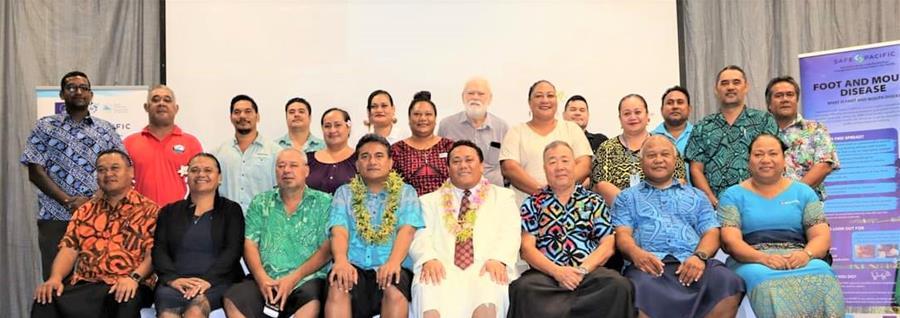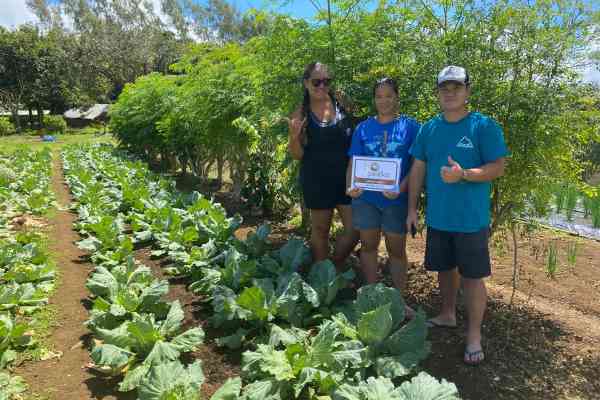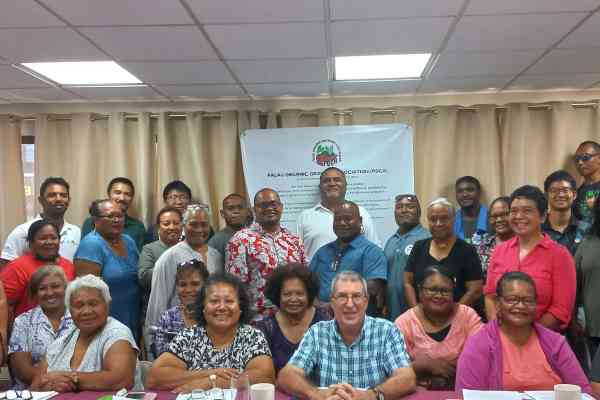Photo: SPC's SAFE Pacific team, Ministry of Agriculture representatives, biosecurity officers and participants at the Sea Container Hygiene System Workshop. Credit: SPC
First of its kind seminar tackles plant pests and diseases through sea container hygiene
In continuing efforts to minimise plant pest and disease spread through sea containers, the Pacific Community in collaboration with Samoa’s Ministry of Agriculture and Fisheries (MAF) Quarantine Division organised a seminar on strengthening the implementation of the Sea Container Hygiene System (SCHS) on Friday, 24 February in Apia, Samoa. The SCHS is a long-term strategy developed in collaboration with New Zealand, Australia and the shipping industry to manage biosecurity risks from sea containers loaded from high-risk ports in the Pacific Islands.
The seminar, titled Managing Biosecurity Risks with Sea Container Hygiene System was supported by the ‘Safe Agriculture trade Facilitation through Economic integration in the Pacific’ (SAFE Pacific) project funded by the European Union. The event was facilitated by the Pacific Community's (SPC) Land Resources Division biosecurity specialists Dr Visoni Timote and Riten Gosai.
The seminar was first of its kind to engage with other border agencies and key stakeholders including exporters and importers, pack-house operators, farmer associations, freight forwarders and shipping lines.
“We all know about the devastating effects of pests like the coconut rhinoceros beetle, giant African snail and others, which were accidentally introduced into our country most likely via imported soil and plant material, and on sea containers," said MAF CEO Tilafono David Hunter during the opening event. “These pests continue to pose serious threat to our food production and income security, and we don’t have the capacity to control their spread once they are in the country.”
Included in the seminar were an introduction to SCHS, information on emerging pest threats, promotion of a holistic approach to clean sea containers and the role of each stakeholder in aligning to these processes.
"Around eighty percent of world trade occurs via sea with the majority cargo carried in sea containers,” said Dr Timote. “Every year, hundreds of thousands of sea containers transit through the Pacific, and national plant protection organisations, such as the Samoa Quarantine Division must inspect those entering the country and ensure they are free from pests and diseases."
Dr Timote said implementing the SCHS is crucial and has proven effective as it streamlines processes for standard cleaning procedures and ensures compliance, resulting in reduced biosecurity interventions and more importantly, reduction in pest loads that would normally be carried by dirty or improperly cleaned containers.
“Shipping and sea containers are an important element to trade and it’s important to safeguard these pathways to protect Samoa’s reputation and market access,” he said. “The SCHS eases biosecurity processes, reduces costs and improves time efficiency, increasing economic benefits for Pacific countries.”
Further knowledge and capacity building on this topic will be provided to additional Pacific countries and communities during SAFE Pacific Project implementation over the next three years.
Media Contacts:
Maryann Lockington, Communications Officer, Safe Pacific Project, Pacific Community (SPC) | [email protected]
Dr. Visoni Timote, Integrated Biosecurity/SPS Coordinator, Pacific Community (SPC), Land Resources Division | [email protected]
Riten Gosai, Biosecurity SPS Officer, Pacific Community (SPC), Land Resources Division | [email protected]
For general media enquiries, please contact [email protected]
About SPC:
The Pacific Community has been supporting sustainable development in the Pacific, through science, knowledge and innovation since 1947. It is the principal intergovernmental organisation in the region, owned and governed by its 27 member countries and territories. www.spc.int
Follow SPC News | Facebook | Twitter | LinkedIn | Instagram | YouTube and subscribe to SPC's Newsletter


